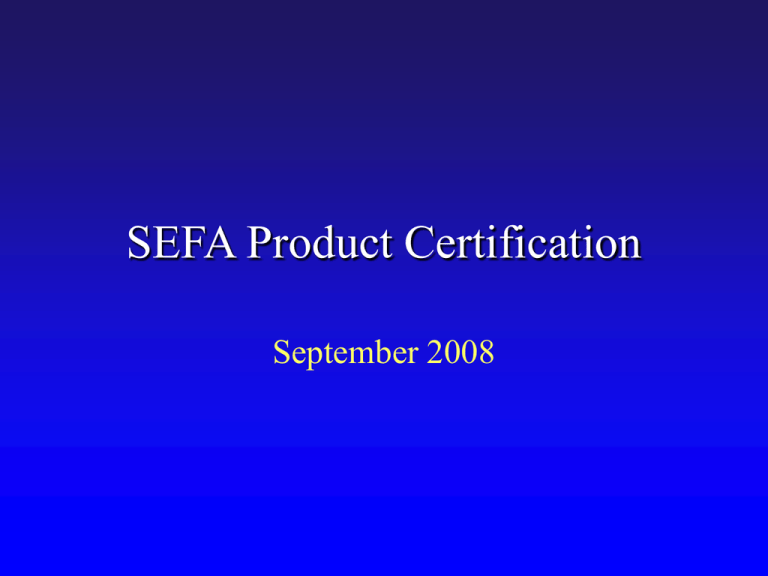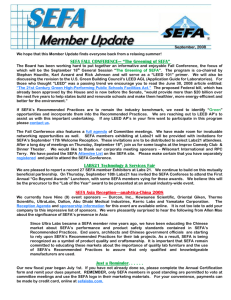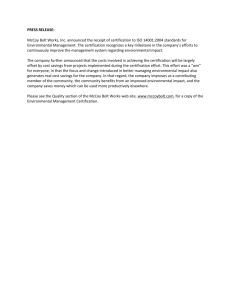SEFA Company Certification
advertisement

SEFA Product Certification September 2008 Why Product Certification? Why Product Certification? SEFA Strategic Plan (November 1997) Strategic Initiative #3/ Certification “Certification should become the standard for the industry, particularly as the industry changes. This will require education to specifier and owner. In, addition, it will require expansion of certification to the international arena. ” What are the Goals? Establish worldwide recognition of the significance of the Certification. Work with relevant trade publications and professional journals to get the message published. Promote the “VALUE” of the certification process as a method of obtaining professional, high quality labs in an environment that is often controlled by channel customers such as General Contractors without full accountability to the process or the owner. Establish a clear expectation of the role of the various parties that influence the process of the building quality laboratories through the concerted marketing effort by SEFA and individual members. Recruit and certify manufacturers that derive the majority of their business from supplying “Laboratory Grade” furniture and equipment to the laboratory environment. The certification program would be open to all manufacturers and would be non-resistive. Establish fair and reasonable criteria for certification. SEFA will establish requirements that have “benchmarks” that are obtainable and with reasonable restrictions. The certification standards will not eliminate and/or harm any competitors within the marketplace. SEFA certification needs to be a voluntary process by which the organization grants recognition to a company who has met the established qualifications. Mission Establish a “voluntary” SEFA-based program of product certification. SEFA would develop a protocol/procedure in which an independent testing organization, using criteria set by SEFA, would evaluate a candidates product for compliance. Mission A “SEFA Certified” product would bear a certification seal and would be recognized in the marketplace as a quality manufacturer able to meet established performance standards as stated in SEFA's Recommended Practices. Mission These standards would be recognized by international government agencies, architects, specifiers, general contractors/construction managers and end users. Mission “Recommended Practices” would evaluate a candidates product to measure whether or not the organization’s product meets the established performance criteria set forth. Mission Tests would be performed by an approved thirdparty independent certifier. The ensuing result would, if the candidate passes the established criteria, would earn the company a “SEFA Certified” rating and would carry the certification seal for that product group. Mission Companies not approved by SEFA product certification process may not claim or imply conformance with these standards. SEFA would reserve the right to question any claims of conformance (enforcement) and request SEFA third-party, independent test reports of any company stating they are certified. What are the Objectives? Objectives SEFA product certification needs to be a voluntary process by which the SEFA organization grants recognition to a company’s product which has met the established qualifications. Objectives Certification is the best vehicle for accomplishing SEFA’s mission and strategic goals. SEFA will need to sell the value of an independent, industrydriven product certification program that recognizes quality “SEFA Certified Product” . Objectives The certification program would be open to all SEFA Executive Members. Objectives The certification program must have both perceived and real value to the supporting market to which it serves. Additionally, the certification program must be marketed and have real value to memberships of other professional organizations that are “influencers” within the market (i.e. AIA, AWI, CSI, IFMA, etc.) Objectives Once a company gains “SEFA Product Certification” and has been verified to fabricate products according to these high quality and performance standards, they in effect, would be pre-qualified to perform work when SEFA Recommended Practices have been incorporated into the project specifications. Deliverables Approved by the SEFA executive membership November 18, 2004 by a vote (25 yes, 2 no) 1. Establish protocol for voluntary product testing, submission, duration and/or modifications. 2. Identify and establish SEFA approved 3rd party, independent testing facilities, (including international locations) to perform testing. 3. Begin with SEAF 8 certification and possibly follow as standards are desired by the other product groups. 4. Third-party testing documentation and report results will be submitted to the Board of Directors for review and approval. 5. Board of Directors will either approval or reject the use of the SEFA 8 certification logo. Deliverables 1. Establish protocol for voluntary product testing, submission, duration and/or modifications. • Submit production cabinets defined in SEFA 8 for third party testing, independent testing • Production cabinets and tables will be considered a standard company product with assigned product numbers, bill of materials and cataloged • Self testing will not be recognized as SEFA approved • If all product submittals pass the SEFA 8 test, final report will be sent to said manufacturer and SEFA HQ. • All final report documents will be held at the SEFA office for future reference Deliverables 1. Establish protocol for voluntary product testing, submission, duration and/or modifications. • After the Board approval, the product line would receive the SEFA 8 certification logo approval • Certification logo would be displayed on products, printed and electronic communications (optional) • There would be no terms duration on the said report as long as the cabinet construction remains as tested (open for discussion). • All SEFA 8 certified product manufacturers would be required to pay an annual $100 renewal fee to keep SEFA HQ files current • Any new construction and/or hybrids product engineered and manufactured would be required for resubmittal Deliverables 2. Identify and establish SEFA approved 3rd party, independent testing facilities, (including international locations) to perform testing. • Certification committee to draft RFP for testing agencies. All testing agencies will be open for consideration - complete • Testing and approvals will only valid by testing agencies recognized and approved by the Board of Directors. Self testing will not recognized as SEFA 8 approved • 9 (nine) domestic and international testing agencies have been approved. Agencies have been posted on the SEFA website Other Deliverables Begin with SEAF 8 certification and possibly follow as standards are desired by the other product groups Product Certification • Questions and Discussions





